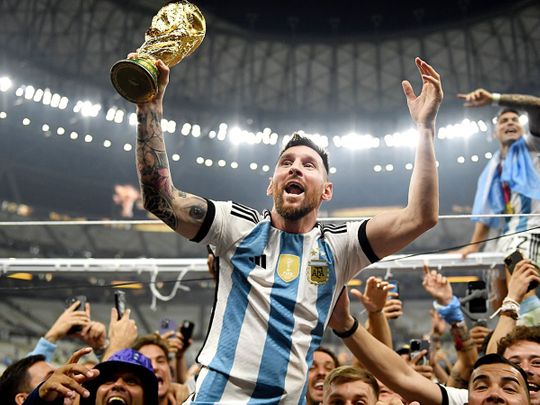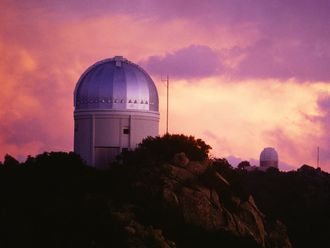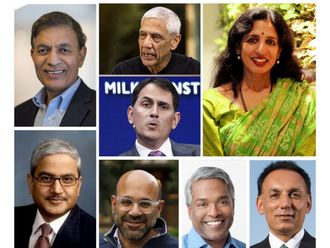
The Qatar World Cup was Lionel Messi’s stage. His last World Cup. His last shot at World Cup glory. The Argentine captain wasn’t prepared to waste this opportunity. Time and again over four weeks, the 35-year-old showed why he’s one of the football greats. But he needed the World Cup as proof. His magic is the story of the 22nd World Cup. It was Messi’s coronation in Qatar.
Here’s a look at how Messi chased the trophy, how Qatar delivered a dream World Cup and trivia from the football fiesta.

How Messi wrote the perfect ending to his fairytale
The kiss said it all. It clearly showed how much the World Cup meant to Lionel Messi. There was a glint in his eye as the Argentine captain stopped to look at the gleaming golden trophy. Messi stepped forward, patted its dome, and kissed it lightly. That wasn’t enough. He kissed it once more and smiled at the knowledge that it was his before walking away. It was a telling moment. An iconic moment that revealed how much it mattered.
He’s been chasing it for over 17 years. Finally, in his 26th World Cup appearance, Messi bagged the elusive trophy. With a winner’s medal around his neck and a ceremonial bisht (Arab men’s cloak) draped over his shoulders, Messi hoisted the trophy and was carried around the field on his teammates’ shoulders.
Lusail Stadium was a sea of blue and white, and the La Albiceleste supporters waved, danced and sang in celebration. Their 36-year wait was finally over. Argentina were last crowned world champions in 1986 when Diego Maradona’s magical skills floored their opponents and wowed the world. In Qatar, it was another left-footed wonder that delivered the trophy.
Messi steps out of Maradona’s shadow
Messi is a football genius in his own right. But he suffered from the long shadow cast by Maradona and his World Cup-winning feat. Messi seemed keen to rectify that when he arrived in Qatar on December 16. Even a loss to Saudi Arabia wouldn’t stop him; he reportedly gave an inspirational talk on the team bus. Since then, Argentina haven’t lost a game. Not even the final.
The little magician worked wonders to extricate Argentina from tight spots. In the group stages, when Mexico frustrated Argentina, Messi’s left foot conjured a goal from 20 yards. Australia stalled Argentina in the Round of 16 only for Messi to whip out his trademark touches and passes before breaching the net for his 789th goal in 1,000 international appearances.
Messi’s dream nearly soured in the semifinals. The Netherlands overturned a two-goal deficit and pushed the ill-tempered game into the penalty shootout. Argentina emerged victorious at the end of the fiery match that saw 17 yellow cards and a red card. Even the calm Messi lost his cool, shouting at a Dutch player. It was more proof of how desperate Messi and the Argentinians were to win the cup.
Argentina’s reliance on Messi
What was also inescapable was Argentina’s reliance on Messi. Enzo Fernandes and Julian Alvarez looked good, but it required Messi’s creativity to unlock doughty defences. The pass that found a tiny gap in the Dutch defence for Nahuel Molina to open the scoring is a fine example. It had the trademark Messi stamp on it.
For the first time in the tournament, Argentina looked like a champion side when they ran circles around France in the final. The urgency and aggression reflected their keenness to win for Messi. That would be the best farewell present.
Messi was there, orchestrating the moves with incisive passes. One flick pass at a 45-degree angle released Alexis Mac Allister, leading to Angel Di Maria’s goal. When France hit back through Kylian Mbappe, Messi’s rarely-used right foot struck the goal to put Argentina ahead in extra time.
The perfect end to Messi odyssey
A storm must have raged through Messi’s mind since shootouts are perilous. He didn’t fail; he couldn’t afford it. For this is his World Cup. The rest of the La Albiceleste too held their nerves.
Joy, tears and relief. Argentinians didn’t stop waving and dancing. The song ‘Muchachos’ rang out in the stadium. The players joined the chorus, and Messi ambled across the field to join them.
He’s got nothing left to prove. There’s no more missing silverware: first the Copa America, now the FIFA World Cup. That’s the fitting end to the fairytale of Messi. He owned the Qatar World Cup.

Qatar delivered a World Cup to remember
Fireworks lit up the night sky at the Lusail Stadium. The golden crucible, bathed in floodlights, stood proud as the Qatar World Cup wound down on Sunday (December 18) in a blaze of pyrotechnics. The singing, cheering, and dancing continued in the stadium as Argentinians celebrated a World Cup win after 36 years. A proud moment for Argentina and Lionel Messi.
Beyond the spotlights, Qatari officials must have been beaming with pride. Proud that they have delivered a fantastic World Cup. The exhilarating final only served to burnish the tournament.
The first World Cup in the Middle East, the first in the Arab world and the second in Asia came with huge expectations. And fears. Can Qatar handle an event of this magnitude? After all, this is the biggest sporting event on Earth.
read more
A World Cup with Middle Eastern flavour
Qatar answered those questions with a tournament to remember. A $220 billion project transformed the gulf nation with new state-of-the-art stadiums, a new city, a new metro and much more. The result was a unique World Cup experience. Spectators went home gushing about the warm hospitality and the excellent facilities.
A World Cup in the Middle East had its own flavour. It was a boon to people in the region and the rest of Asia. Qatar was easily accessible. So hundreds of thousands of people flew into Doha for the matches: 120 flights took off from Dubai World Central every day.
Expatriates in Gulf states too savoured the World Cup experience, a first for most of them. Among them were ardent supporters of Argentina and Brazil. So all the spectators in the blue and white La Albiceleste colours didn’t hail from Argentina. Several thousands were from the south Indian state of Kerala, and working in the UAE.
Morocco’s dream run
Qatar may have had a forgettable World Cup debut, losing all their matches. But the tournament was replete with upsets and none more stunning than the fairytale run of Morocco, who became the first Arab and African nation to make the semifinals. Japan and South Korea kept the Asian flag fluttering with their hard running and swift counter-attacks.
It was also Messi’s last World Cup. And he owned it with several magical moments to haul Argentina into the final. And what a final that was. Certainly one of the best. May be, even the best.
The Messi coronation was the icing. The ultimate prize in football was finally in his grasp. It was the moment when greatness descended on the little man. Qatar will be remembered for that too.
More importantly, Qatar delivered a World Cup to remember.
A World Cup in the Middle East. A winter World Cup. These are what made the Qatar edition unique. It will go down in history as Messi’s coronation.









